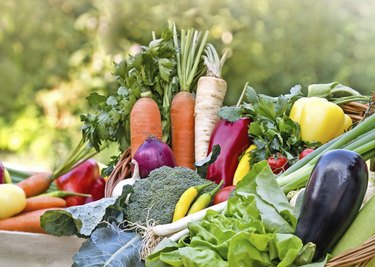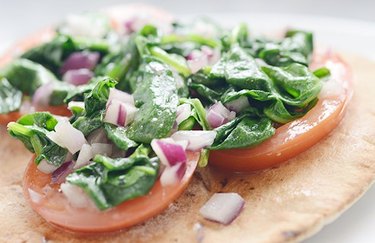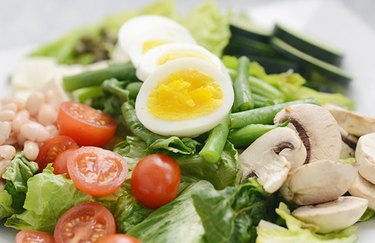
In a world where vitamins C and D get all the attention, it can be easy to forget about your B vitamins. Definitely an understated nutrient, B vitamins are crucial for keeping your body and mind functioning properly.
Although many key sources of vitamin B are animal-based, there are plenty of veggies you can eat to increase your daily intake.
Video of the Day
Video of the Day
Next time you're in the produce aisle, add these vitamin B vegetables to your cart.
Vegetables High in B Vitamins
While animal-based foods like fish, eggs and dairy products are great sources of B vitamins, you can still get your daily dose from plant-based sources, according to the U.S. National Library of Medicine.
As you make your favorite salad or stir fry, consider adding some of these vitamin B-loaded veggies. Note that nutrition is per 1 cup serving, according to the USDA.
1. Asparagus
Vitamin B1 | 0.192 mg |
Vitamin B2 | 0.189 mg |
Vitamin B3 | 1.31 mg |
Vitamin B5 | 0.367 mg |
Vitamin B6 | 0.122 mg |
Vitamin B9 | 69.7 mcg |
2. Broccoli
Vitamin B1 | 0.064 mg |
Vitamin B2 | 0.105 mg |
Vitamin B3 | 0.575 mg |
Vitamin B5 | 0.96 mg |
Vitamin B6 | 0.158 mg |
Vitamin B9 | 56.7 mcg |
3. Brussels Sprouts
Vitamin B1 | 0.122 mg |
Vitamin B2 | 0.079 mg |
Vitamin B3 | 0.656 mg |
Vitamin B5 | 0.272 mg |
Vitamin B6 | 0.193 mg |
Vitamin B9 | 53.7 mcg |
4. Collards
Vitamin B1 | 0.019 mg |
Vitamin B2 | 0.047 mg |
Vitamin B3 | 0,267 mg |
Vitamin B5 | 0.096 mg |
Vitamin B6 | 0.059 mg |
Vitamin B9 | 46.4 mcg |
5. Edamame
Vitamin B1 | 0.31 mg |
Vitamin B2 | 0.24 mg |
Vitamin B3 | 1.42 mg |
Vitamin B5 | 0.612 mg |
Vitamin B6 | 0.155 mg |
Vitamin B9 | 482 mcg |
6. Green Peas
Vitamin B1 | 0.414 mg |
Vitamin B2 | 0.238 mg |
Vitamin B3 | 3.23 mg |
Vitamin B5 | 0.245 mg |
Vitamin B6 | 0.346 mg |
Vitamin B9 | 101 mcg |
7. Mustard Greens
Vitamin B1 | 0.045 mg |
Vitamin B2 | 0.062 mg |
Vitamin B3 | 0.448 mg |
Vitamin B5 | 0.118 mg |
Vitamin B6 | 0.101 mg |
Vitamin B9 | 6.72 mcg |
8. Romaine Lettuce
Vitamin B1 | 0.034 mg |
Vitamin B2 | 0.031 mg |
Vitamin B3 | 0.147 mg |
Vitamin B5 | 0.067 mg |
Vitamin B6 | 0.035 mg |
Vitamin B9 | 63.9 mcg |
9. Spinach
Vitamin B1 | 0.078 mg |
Vitamin B2 | 0.189 mg |
Vitamin B3 | 0.724 mg |
Vitamin B5 | 0.02 mg |
Vitamin B6 | 0.195 mg |
Vitamin B9 | 194 mcg |
10. Turnip Greens
Vitamin B1 | 0.039 mg |
Vitamin B2 | 0.055 mg |
Vitamin B3 | 0.33 mg |
Vitamin B5 | 0.209 mg |
Vitamin B6 | 0.145 mg |
Vitamin B9 | 107 mcg |
Benefits of B Vitamins
There are eight different kinds of B vitamins, all of which your body needs to stay healthy and function properly. And while these vitamins are all within the same umbrella, they each serve their own purpose.
- Vitamin B1 is also known as thiamin. This vitamin is absorbed by your small intestine and is found in many animal meats, like pork and trout, according to the National Institutes of Health (NIH). Thiamin is used to support healthy cell growth and development.
- Vitamin B2, also known as riboflavin, is mostly found in organ meats and green veggies like asparagus and broccoli, according to the NIH. Riboflavin is important for cell growth but also helps your body turn food into energy.
- Vitamin B3 or niacin helps convert food into energy and helps with cell health, per the NIH.
- Vitamin B5 (aka pantothenic acid) helps your body absorb and process fatty acids, according to the NIH.
- Vitamin B6 is responsible for more than 100 reactions in the body, according to NIH. Mostly, though, this vitamin is responsible for protein metabolism.
- Vitamin B7 (aka biotin) helps your body process amino acids and carbohydrates, according to the Mayo Clinic.
- Vitamin B9 or folate is often found in dark, leafy greens. Folate helps your body form red blood cells and is especially crucial in early pregnancy, according to the Mayo Clinic.
- Vitamin B12 is mostly found in poultry, meat and fish, according to the Mayo Clinic. This vitamin helps support proper nerve function and red blood cell formulation.
B-Vitamin Veggie Recipes
1. Spinach Feta Pizza

- Calories: 384
- Protein: 16 grams
Spinach is a great source of vitamin B, making this spinach feta pizza a totally guilt-free dinner. Plus, this pizza is topped with feta cheese, which supplies about 20 percent of your daily recommended value of vitamin B12 per ounce, according to the USDA.
Get the Spinach Feta Pizza recipe and nutrition info here.
2. Asparagus and White Bean Salad

- Calories: 528
- Protein: 26 grams
As mentioned above, asparagus is a great source of vitamin B but adding beans and eggs makes it the perfect dish of B vitamins.
One hard-boiled egg will supply about 23 percent of your daily recommended value of vitamin B12, according to the USDA. Eggs are also high in choline, an essential nutrient that helps support normal brain function.
Get the Asparagus and White Bean Salad recipe and nutrition info here.
3. Balsamic Glazed Brussels Sprouts With Garlic

- Calories: 100
- Protein: 2 grams
This low-calorie Brussels sprouts recipe makes an excellent side dish or snack. Brussels sprouts are not only a great source of B vitamins but they'll also supple more than 100 percent of your daily recommended value of vitamin K per cup, according to the USDA.
Get the Balsamic Glazed Brussels Sprouts With Garlic recipe and nutrition info here.
- USDA: "Asparagus"
- USDA: "Broccoli"
- USDA: "Brussels Sprouts"
- USDA: "Edamame"
- USDA: "Peas"
- USDA: "Mustard Greens"
- USDA: "Romaine"
- USDA: "Spinach"
- USDA: "Turnip Greens"
- USDA: "Collards"
- U.S. National Library of Medicine: "B Vitamins"
- NIH: "Vitamin B6"
- Mayo Clinic: "Biotin"
- Mayo Clinic: "Folate (Folic Acid)"
- Mayo Clinic: "Vitamin B-12"
- USDA: "Feta"
- USDA: "Hard Boiled Egg"
- NIH: "Pantothenic Acid"
- NIH: "Niacin"
- NIH: "Riboflavin"
- NIH: "Thiamin"
- USDA: "Food Search"
- USDA National Nutrient Database: Vitamin B-12 Content of Selected Foods
- Linus Pauling Institute: Pantothenic Acid
- Linus Pauling Institute: Biotin